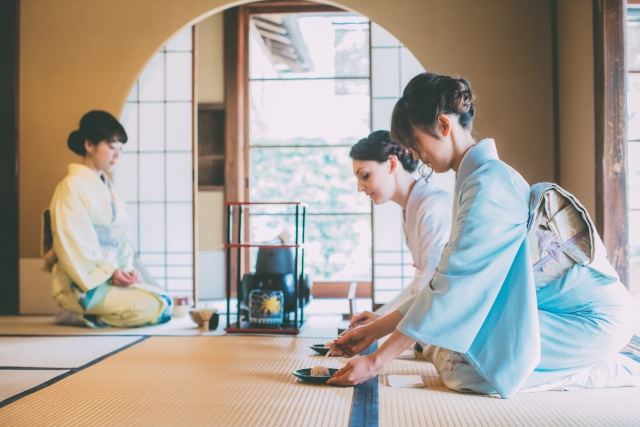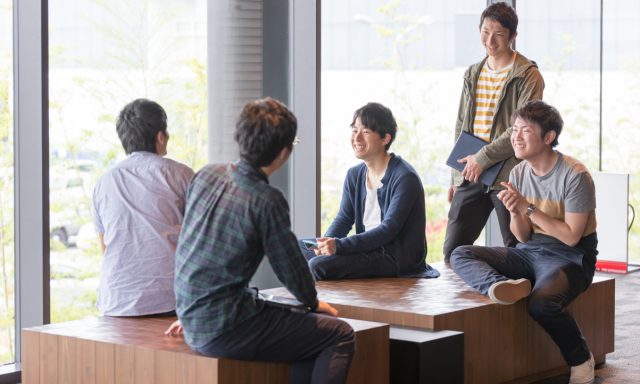Culture Experiences for Foreigners

| One of the most defining aspects of Japan as a whole is it’s rich and very well preserved culture. With only limited contact with foreign countries until the beginning of the Meiji Period in the late 19th century, Japan’s traditional culture was able to thrive and the country was able to slowly incorporate modern technologies while maintaining it’s distinct identity. Many of these traditions are only practiced in Japan and are worth experiencing at least once in your lifetime. |
Kadō (Japanese Flower Arranging)
Kadō directly translates to “the way of the flower” and is more popularly recognized as ikebana (living flower) around the world. Its history dates back to about the 6th century CE which is about the time Buddhism arrived in Japan. A minimalist art, kadō takes line, form, and mass as well as the use of empty space into consideration when creating an arrangement. Creating a sense of harmony in the work is what is most important in this art. Kadō often uses flowers, plants, seeds, and other natural matter that reflect the current season demonstrating the Japanese people’s connection to nature and everyday life. There are many venues around Japan offering kadō culture experiences and some are even catered to foreign guests making them great places to learn more about the art form and possibly start a new hobby.
Sadō (Tea Ceremony)
The way of tea, or sadō, is another one of Japan’s long-enduring traditions that have become world-renowned. Tea was originally drunk for medicinal purposes before it became a beverage for people to enjoy. The ritualization of tea preparation began around the 12th century CE as a Zen ritual. There are formal and informal types of tea ceremonies and there are many different sadō. Whatever the situation, tea from dried and powdered green tea leaves (matcha) is generally prepared at tea ceremonies and is enjoyed with some form of Japanese seasonal confectionery. The concept is very simple, however, there are many fine details of which hosts and guests much take care to observe but this not dissuade those from joining a tea ceremony. Many Japanese people have difficulty remembering what to do and when to do it. This is part of the fun and should be regarded as a learning experience which all are recommended to take a part in when visiting Japan.
Taiko (Japanese Drumming)
Whether it be hitting rocks together, castanets, or a snare drum, percussion exists all around the world and is the most basic form of music. Music is common to all cultures in the world and Taiko drumming is one of many extant traditional music practices in Japan. Making their way to Japan via China and Korea around the 6th century CE, Taiko drums used to be used as war drums, during religious rituals, in court music, and even in traditional forms of Japanese theater. Now, taiko are common staples at Japanese festivals and have also risen in popularity so much that professional troupes are formed to produce high-cost stage performances around Japan and the world. There are even taiko fitness programs available. Regardless of your sense of rhythm, taiko is a fun experience for people of all ages and is definitely something to try your hand at when in Japan.
Zazen (Seated Meditation)
Zen meditation, or zazen (seated meditation) in Japanese, is practiced in Zen Buddhism to achieve enlightenment through achieving peace, clarity, and self-discovery as the Buddha once did. There are many sects of Zen Buddhism each with variations on the practice but in general, the concept is the same: sit and let all words, images, ideas, and thoughts pass without getting involved in them. Zen meditation experiences are hosted by monks in temples around the country and are sometimes followed by a small tea ceremony. This is a welcome treat for those who might have been whacked with keisaku (warning stick) for sleeping or losing concentration during meditation.
So Much More
This is only the tip of the iceberg as many more cultural experiences await you in Japan. Whether it be enjoying a kabuki show, sparring and eating with sumo wrestlers, or making Japanese sushi with your own hands, there is always something new and interesting to try in Japan. Don’t let an opportunity pass you by.




